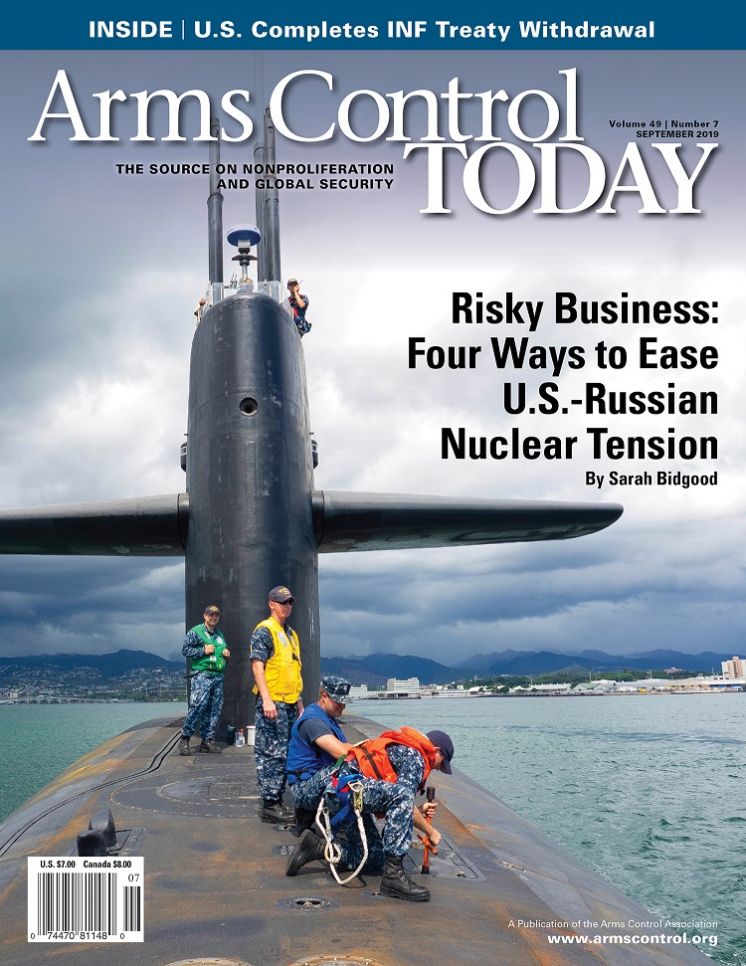Arms Control Today, News in Brief, September, 2019
The publication of the News in Brief section of Arms Control Today magazine is a joint project of the Center for International Security and Policy and The Arms Control Association.
Bolivia Ratifies Ban Treaty
Bolivia ratified the Treaty for the Prohibition of Nuclear Weapons on Aug. 6, marking the 25th ratification overall and the halfway point toward the 50 ratifications needed for the treaty’s entry into force.
The date, exactly 74 years after the atomic bombing of Hiroshima, was selected by Bolivian ambassador Sacha Llorenti for its significance to nuclear disarmament activists. 70 states have now signed the agreement, which was opened for signature at the United Nations in 2017. It is the first international instrument to comprehensively ban the development, testing, production, stockpiling, stationing, transfer, use and threat of use of nuclear weapons. All states parties engaging in these activities are bound to submit and implement a plan to divest themselves completely of nuclear weapons upon ratification.
Although it has been dismissed by the nuclear-armed powers, as well as by states which benefit from nuclear security guarantees, the treaty's supporters hope that it will nonetheless pave the way for an emerging international legal norm against nuclear arms. — OWEN LeGRONE
U.S. Ambassador to Russia Resigns
Jon Huntsman Jr., the U.S. ambassador to Russia, has announced his resignation effective Oct. 3. He stated in his Aug. 5 resignation letter that his time in Moscow had been a “historically difficult period in bilateral relations.” His service, beginning March 2017, was marked by infighting within the U.S. government over the correct approach to diplomacy with Russia. It also coincided with the U.S. withdrawal from the Intermediate-Range Nuclear Forces Treaty, a decision he described in December 2018 as necessary “to preserve the viability and integrity of arms control agreements more broadly.”
“We must continue to hold Russia accountable,” he said in his resignation letter.
Huntsman previously served as U.S. ambassador to China from 2009 to 2011 and to Singapore from 1992 to 1993. Political observers have speculated that he may seek to become the governor of Utah, a post he has already won twice. The White House has not yet nominated Huntsman’s replacement. — OWEN LeGRONE
France Admits Nuclear Coercion in Polynesia
French President Emmanuel Macron signed a new law July 5 acknowledging that Paris coerced French Polynesia into hosting nuclear testing from 1966 to 1996. Introduced as a revision of a 2004 statute governing Polynesian territorial autonomy, the law states that French Polynesia was made to participate by France in “the construction of its nuclear deterrent and national defense.” Previously, French leaders had simply praised the territory for its role in testing. France is now legally committed to the “economic and structural reconversion” of the area.
The law permits the government to compensate Polynesians affected by radiation-induced illness over the course of the tests, but France’s Constitutional Council struck down a provision allocating $100 million annually for remediation on June 27. Expressing frustration with the difficulty of receiving compensation, Polynesian opposition groups have called for the law to be overturned altogether.
A total of 193 nuclear tests were conducted in French Polynesia near the atolls of Moruroa and Fangataufa, many of which were atmospheric explosions. Declassified documents revealed in 2013 that radioactive contamination was much more extensive than the government had previously admitted. — OWEN LeGRONE

